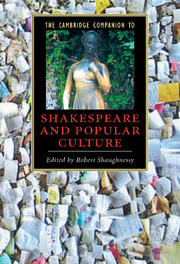Book contents
- Frontmatter
- Introduction
- 1 From popular entertainment to literature
- 2 Shakespeare abbreviated
- 3 Shakespearean stars: stagings of desire
- 4 Shakespeare illustrated
- 5 Shakespeare: myth and biographical fiction
- 6 Narration and staging in Hamlet and its afternovels
- 7 Shakespeare serialized: An Age of Kings
- 8 Musical Shakespeares: attending to Ophelia, Juliet, and Desdemona
- 9 Shakespeare overheard: performances, adaptations, and citations on radio
- 10 Shakespeare on the tourist trail
- 11 Performing Shakespeare in digital culture
- 12 Shakespeare’s popular face: from the playbill to the poster
- Further reading
- Index
- Series List
2 - Shakespeare abbreviated
Published online by Cambridge University Press: 28 November 2008
- Frontmatter
- Introduction
- 1 From popular entertainment to literature
- 2 Shakespeare abbreviated
- 3 Shakespearean stars: stagings of desire
- 4 Shakespeare illustrated
- 5 Shakespeare: myth and biographical fiction
- 6 Narration and staging in Hamlet and its afternovels
- 7 Shakespeare serialized: An Age of Kings
- 8 Musical Shakespeares: attending to Ophelia, Juliet, and Desdemona
- 9 Shakespeare overheard: performances, adaptations, and citations on radio
- 10 Shakespeare on the tourist trail
- 11 Performing Shakespeare in digital culture
- 12 Shakespeare’s popular face: from the playbill to the poster
- Further reading
- Index
- Series List
Summary
Polonius. This is too long. Hamlet. It shall to the barber's, with your beard.
(Hamlet, 2.2.501-2)A heavily condensed version of Hamlet, still with Shakespeare's text, still with the same story line – but speeded up. Now there's no need to sit through the full 4 hours!
(Gail from Surrey, UK, on Tom Stoppard's The Fifteen Minute Hamlet, on amazon.co.uk)Henry IV in Kent
On 27 February 1623, Edward Dering noted in his “Book of expenses” a payment of 4 shillings to “Mr Carington for writing out the play of King Henry IV” at a rate of 1½ pence per sheet. Edward, then a young man of twenty-five, recently widowed, was living at his family home in Surrenden in Kent and had a passion for plays. He regularly went to the theatre in London and caught performances by companies on tour in Kent. He bought plays at an extraordinary rate: over fifty a year, including, on 5 December 1623, the first recorded purchases of the Shakespeare First Folio as well as a copy of the Works of Ben Jonson. He also organized amateur productions at his home, often buying multiple copies of a play for the purpose, casting other members of his family and neighbours and their servants, including, for a proposed production of John Fletcher's The Spanish Curate, “Jack of the buttery.”
But the payment to the rector of the nearby parish of Wootton for copying out Henry IV was different. Dering could have bought a number of copies of the fifth quarto of Shakespeare's Henry IV Part 1, published in 1613, or of the only published version of Henry IV Part 2. He certainly had at least one of each of these books. He chose not to buy more. He chose, too, not to produce one or the other play. Instead he saw the two plays as parts of a single whole and created his own version of both plays, conflating them into a single work, cutting scenes and characters and whole sections of the plot completely, adding a few bridge passages and adjustments consequent on the cuts or the problems of the printed texts, making a new, briefer, different Shakespeare play.
- Type
- Chapter
- Information
- Publisher: Cambridge University PressPrint publication year: 2007
- 7
- Cited by

